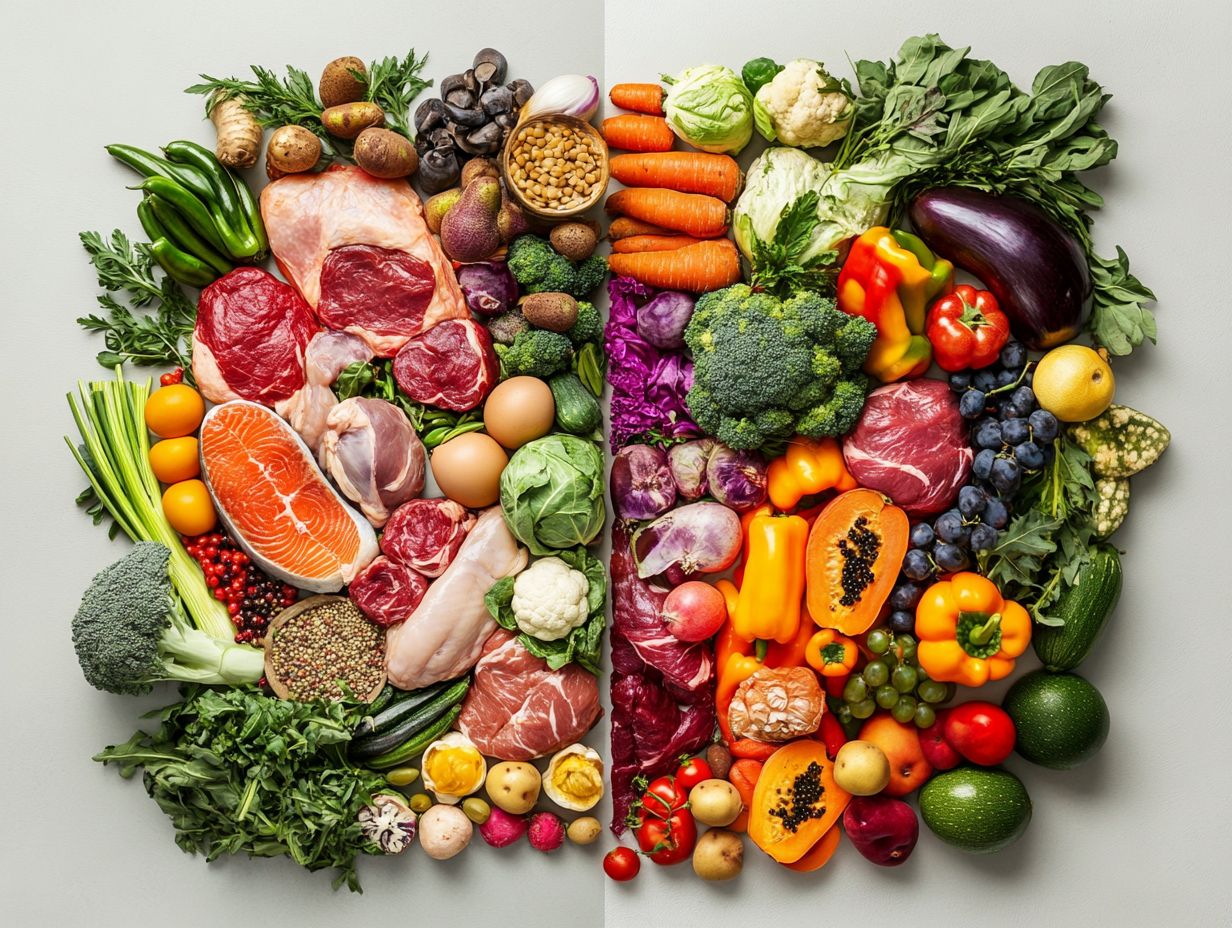In the field of nutrition, two diets stand out as being fundamentally opposed: the Carnivore Diet and the Vegan Diet. The Carnivore Diet is a strict meat-only approach, while the Vegan Diet focuses exclusively on plant-based eating. Each diet offers unique benefits and risks, making them suitable for different lifestyles and health goals. This article will explore the fundamentals of both diets, highlighting the advantages and challenges associated with the Carnivore and Vegan diets to assist you in determining which option may be best for you personally.
What Is the Carnivore Diet?

The carnivore diet is a highly restrictive eating plan that consists solely of animal products, emphasizing high protein quality and excluding all plant foods. This diet has gained popularity due to its potential health benefits, particularly for weight management, reducing inflammation levels, and enhancing mental health, as it includes meat, fish, eggs, and some dairy products.
Proponents argue that the quality of protein and fat consumed is sufficient to meet nutritional needs on this diet. Additionally, they contend that ethical considerations regarding food sourcing and animal welfare are addressed, making the carnivore diet as much a philosophy as a dietary choice with significant philosophical underpinnings.
What Is a Vegan Diet?
A vegan diet is a strictly plant-based dietary approach that excludes all animal products. Adopting veganism is often motivated by ethical reasons, including animal welfare, environmental sustainability, and numerous health benefits.
Individuals following a vegan diet typically have a lower risk of chronic diseases such as heart disease, diabetes, obesity, and certain cancers. While a vegan diet can be healthy, it requires careful consideration to ensure nutritional adequacy, particularly regarding essential nutrients such as vitamin B12, iron, and omega-3 fatty acids.
What Are the Benefits of the Carnivore Diet?
The carnivore diet offers several health benefits that draw followers to alternative dietary practices, primarily due to its high-quality protein and the absence of processed foods. Advocates of this diet claim that it can promote weight management and mental health by lowering caloric intake and enhancing feelings of fullness, as it eliminates carbohydrates.
Additionally, the carnivore diet is linked to improved blood sugar levels, reduced inflammation, and enhanced heart health. Therefore, it is essential to comprehend the nutritional adequacy of animal products, particularly in relation to chronic diseases.
1. Weight Loss
The primary claim of the carnivore diet is its effectiveness for weight loss, which is attributed to its high-quality protein and low carbohydrate content that promote a sense of satiety.
This feeling of fullness is a result of the body’s response to protein intake, which stimulates the secretion of hormones such as peptide YY and glucagon-like peptide-1. These hormones contribute to the sensation of fullness.
Additionally, the low carbohydrate content may lead to favorable metabolic adaptations, encouraging the body to utilize fat stores as its main energy source.
When protein intake is prioritized, individuals may build or maintain lean muscle mass, positively impacting their basal metabolic rate.
As a result, those following this dietary lifestyle may experience beneficial changes in body composition, including increased fat loss and lean muscle mass, which support overall health.
2. Improved Blood Sugar Control
The carnivore diet is believed to enhance blood sugar control by eliminating carbohydrates, which results in more stable glucose levels and reduced insulin resistance.
This diet emphasizes the consumption of animal products, which are primarily composed of protein and healthy fats essential for preventing sharp spikes in blood sugar. Research indicates that protein can help stabilize glucose levels, leading to a lower overall glycemic response.
Experts suggest that when carbohydrates are restricted, the body becomes more efficient at utilizing fat for energy, thereby reducing the need for insulin. A study published in Diabetes Care revealed that participants following a low-carbohydrate, high-protein diet experienced significant reductions in fasting insulin levels.
This dietary approach may assist at-risk or diabetic individuals in improving their metabolic health in a personalized manner while still enjoying a diverse and satisfying diet.
3. Reduced Inflammation

Reducing inflammation is often cited as a benefit of the carnivore diet, with proponents arguing that avoiding plant-based foods results in lower exposure to anti-nutrients and inflammatory compounds, which can have a positive impact on heart health and mental health.
Several studies support this claim, indicating that higher levels of certain plant-based compounds can trigger inflammatory responses in sensitive individuals. Consequently, a diet consisting solely of animal products may provide a solution for chronic conditions such as arthritis and autoimmune diseases.
For instance, a study published in the Journal of Inflammation found that diets rich in fatty fish, which are high in omega-3 fatty acids, reduced inflammatory markers in the body.
Additionally, the absence of carbohydrates in a carnivore diet may contribute to lower insulin levels, which is another key factor in reducing inflammation. By following this dietary approach, individuals may experience a decrease in inflammation and an overall improvement in their well-being.
What Are the Benefits of a Vegan Diet?
The vegan diet offers numerous health benefits, primarily due to its emphasis on whole, unrefined plant-based foods such as legumes, whole grains, nuts, fruits, and vegetables that are nutrient-dense and high in fiber.
This focus can lower the risk of developing chronic diseases such as heart disease, obesity, and certain cancers. By eliminating animal products, a vegan diet aids in weight control and may promote a healthy digestive system by enhancing fiber intake and the diversity of the gut microbiome.
Additionally, many individuals adopt a vegan lifestyle to reduce their environmental footprint, aligning their personal health goals with the well-being of the planet.
1. Lower Risk of Chronic Diseases
A vegan diet is linked to a lower incidence of chronic diseases such as heart disease, obesity, and diabetes, primarily due to the consumption of health-promoting plant-based foods that are rich in essential nutrients.
Research indicates that individuals following a plant-based diet generally exhibit healthier eating patterns, which include higher intakes of fiber, vitamins, and phytochemicals, as well as lower consumption of saturated fats and cholesterol typically found in animal products.
For instance, a study published in the Journal of the American Heart Association revealed that people adhering to a vegan diet had a 32% lower risk of heart disease compared to those on a non-vegetarian diet.
Additionally, vegans tend to lead more physically active lifestyles, which further enhances health outcomes and reduces disease risk. These findings emphasize the significance of making conscious dietary choices for long-term health and well-being.
2. Improved Digestive Health
Improved digestive health is another significant benefit of adopting a vegan diet, primarily due to its high fiber content, which promotes healthy digestion and enhances diversity in the gut microbiome.
By focusing on fruits, vegetables, whole grains, and legumes, a vegan diet provides an abundance of dietary fiber. This fiber aids in maintaining regular bowel movements and serves as a prebiotic, providing essential nourishment for beneficial gut bacteria. Prebiotics encourage the growth of good bacteria, ultimately improving overall gut health.
Increased fiber intake is linked to greater microbiome diversity, which is associated with better metabolic health and a reduced risk of gastrointestinal diseases. Experts note that individuals who transition to a vegan diet often experience improved digestive health, with fewer instances of bloating and discomfort, highlighting the positive impact of a nutritious, plant-based diet on digestive well-being.
3. Reduced Environmental Impact
The vegan diet is often embraced for environmental reasons, as it eliminates the need for animal agriculture, a significant contributor to greenhouse gas emissions and resource depletion.
By opting for plant-based foods, individuals can help reduce their carbon footprints; livestock production is estimated to account for approximately 14.5% of the world’s greenhouse gas emissions, according to the Food and Agriculture Organization of the United Nations.
A vegan lifestyle promotes sustainability and the conservation of essential resources such as water and land. Research indicates that producing one pound of beef requires nearly 1,800 gallons of water, whereas the production of plant-based foods requires significantly less water.
Ethically, this dietary choice aligns with a growing awareness of animal welfare, fostering a more humane approach to food sourcing.
In summary, a vegan diet not only supports individual health but also contributes to environmental sustainability and ethical practices in food production.
What Are the Potential Risks of the Carnivore Diet?

When considering the carnivore diet, it is important to weigh the potential risks against its benefits, especially in consultation with healthcare professionals.
One of the most serious concerns is the risk of nutrient deficiencies due to the absence of plant-based foods. This lack can result in insufficient intake of essential vitamins and minerals, such as vitamin B12, iron, and omega-3 fatty acids, potentially affecting iron absorption and leading to long-term health issues.
Additionally, the restrictive nature of this diet limits food choices, which can have negative health implications if adhered to too strictly over extended periods. Long-term health risks associated with such a diet may include an increased likelihood of heart disease and other chronic conditions.
1. Nutrient Deficiencies
Individuals following a carnivore diet often experience nutrient deficiencies, particularly lacking essential nutrients such as vitamin B12 and iron, which may not be consumed in adequate amounts. Vitamin B12 is vital for nerve function and the production of DNA and red blood cells, underscoring its importance in a balanced diet.
Additionally, they commonly miss out on other important nutrients like vitamin D, magnesium, and fiber. Vitamin D is crucial for maintaining bone health and supporting immune system function, while magnesium plays a vital role in muscle and nerve function, energy production, and blood sugar regulation.
Although fiber is not considered a nutrient in the traditional sense, it is essential for digestive health and sustaining a balanced gut microbiome. Therefore, those who adhere too strictly to this diet may need to consider supplementation to prevent long-term health issues and ensure they achieve a complete and balanced nutritional intake.
2. Increased Risk of Heart Disease
The carnivore diet may elevate the risk of heart disease in some individuals due to its high levels of saturated fat and the absence of heart-healthy plant-based foods.
Research indicates that diets rich in saturated fats can lead to increased cholesterol levels, particularly low-density lipoprotein (LDL) cholesterol, commonly referred to as ‘bad’ cholesterol. Studies suggest a correlation between high LDL levels and an increased risk of cardiovascular disease.
A meta-analysis published in the American Journal of Clinical Nutrition found a strong association between saturated fat intake and a higher incidence of heart disease. Additionally, individuals adhering to the carnivore diet do not consume fruits, vegetables, or whole grains, which are essential sources of vitamins, minerals, and antioxidants that promote heart health.
This raises concerns about the long-term effects of the carnivore diet on heart health and suggests that it may not be suitable for everyone, particularly those at a higher risk for cardiovascular disease.
3. Limited Food Choices
The limited dietary options of the carnivore diet present a significant disadvantage, as it reduces meal variety and can lead to inadequate nutrition. With fewer choices available, individuals may not achieve sufficient intake of essential vitamins and minerals, potentially resulting in nutritional deficiencies.
Moreover, the implications of this restrictive diet can extend to social eating occasions. Meals are often considered a social ritual, and adhering to a strict carnivore diet means that individuals frequently find themselves eating alone or consuming different foods than those around them.
The monotony of eating the same animal products daily can lead to boredom and diminish overall happiness. As a result, individuals may experience psychological disturbances, such as cravings and a sense of dissatisfaction, due to the limited flavors and textures offered by a carnivore diet.
What Are the Potential Risks of a Vegan Diet?
While the vegan diet offers numerous health benefits, it also presents potential risks that individuals should consider, particularly concerning possible nutrient deficiencies that may arise from eliminating animal products.
Nutrients such as iron and omega-3 fatty acids can be challenging to obtain in sufficient amounts, which raises concerns for those striving to meet their dietary needs, especially regarding protein adequacy.
Additionally, the restrictive nature of the diet may result in a lack of variety in food choices, which can affect both nutritional intake and meal satisfaction.
1. Nutrient Deficiencies

Nutrient deficiencies can pose a serious challenge for vegans, particularly concerning vitamin B12, iron, and omega-3 fatty acids, which are primarily found in animal products. These nutrients are essential for overall health, energy levels, and brain function. Ensuring adequate intake of vitamin B12 is crucial for vegans, as it supports nerve health and cognitive function.
For instance, vitamin B12 is vital for nerve function and red blood cell production, while iron is crucial for transporting oxygen in the blood. Omega-3 fatty acids contribute to heart health and cognitive function.
Vegans can obtain vitamin B12 from fortified foods such as plant-based milks and nutritional yeast. Iron can be sourced from legumes, nuts, and seeds, and it is beneficial to consume it alongside foods high in vitamin C to enhance absorption.
Flaxseeds, chia seeds, and walnuts are excellent sources of omega-3 fatty acids, enabling those on a vegan diet to meet their nutritional needs without relying on animal products.
2. Difficulty Meeting Protein Needs
Meeting protein needs on a vegan diet can be challenging due to the varying quality of protein in plant-based foods compared to animal products. However, with proper planning and knowledge of diverse food sources, it is entirely possible to fulfill protein requirements.
Vegetables: Beans, lentils, and chickpeas are essential for providing protein and other vital nutrients.
Whole grains: Foods like quinoa, farro, and brown rice serve as excellent complements, offering a range of amino acids when combined appropriately.
Nuts and seeds: Almonds and chia seeds provide healthy fats and additional protein sources.
By balancing these food groups throughout the day, individuals can ensure they receive the necessary protein for a healthy diet.
3. Limited Food Choices
A vegan diet can lead to limited food choices, which may restrict meal variety and potentially affect both enjoyment and adherence to this dietary approach.
These restricted food options can significantly impact social interactions, as food and shared meals are often central to social gatherings, serving as an important means for people to bond and communicate. When options are limited, dining out with friends and family can become challenging, leading to feelings of isolation during social interactions.
Additionally, the lack of variety can affect the overall culinary experience of eating and cooking, as certain ingredients that enhance flavors, textures, and the overall enjoyment of meals cannot be replaced by plant-based alternatives.
For some individuals, the reduction in food choices can have psychological effects; over time, a limited meal variety may result in decreased enjoyment of food and an increased temptation to revert to previous eating habits.
Therefore, it is essential to explore new cooking methods, plant-based ingredients, and recipes to ensure that meals remain enjoyable and that adherence to the diet is sustained.
Which Diet Is Right for You?
Selecting the right diet involves evaluating your personal health goals, values, and lifestyle choices, as well as the practical aspects of each dietary option.
Whether you are considering the pros and cons of the carnivore diet or examining the ethical and health implications of a vegan diet, it is essential to take the time to choose a diet that suits you best.
Consulting healthcare professionals can assist individuals in making these decisions, as they can recommend diets that meet nutritional needs in a sustainable manner.
1. Consider Your Health Goals
When selecting a diet, it is essential to consider personal health goals, whether they pertain to weight loss, chronic disease risk, or overall well-being. Understanding how different diets can either support or hinder these objectives is crucial.
For instance, individuals seeking rapid weight loss may opt for the carnivore diet, which is high in protein and low in carbohydrates, potentially increasing satiety and thereby reducing calorie intake more quickly.
Conversely, those aiming to promote heart health or reduce inflammation might choose a vegan diet, which is abundant in antioxidants, fiber, and essential micronutrients found exclusively in plant foods.
By aligning the type of diet with specific health goals, individuals can achieve more effective results.
2. Take into Account Your Personal Values
When choosing a dietary strategy, it is essential to consider your personal values and beliefs, as these significantly influence the food you select and your overall lifestyle.
This consideration is particularly important for dietary strategies with ethical implications, such as the carnivore and vegan diets, as well as their sustainability aspects.
The carnivore diet advocates for human health, claiming numerous health benefits; however, it can be argued that this diet raises ethical concerns regarding animal welfare and is not environmentally friendly.
In contrast, the vegan diet promotes compassion and environmental stewardship by focusing on plant-based foods, which have been shown to have a lower carbon footprint.
The philosophical foundations of these diets reflect broader societal ethics and challenge individuals to make choices aligned with their moral beliefs.
Making an informed choice not only supports personal health and well-being but also contributes to a vision for a better world.
3. Consult with a Healthcare Professional
Consulting healthcare professionals can offer valuable insights and personalized recommendations for navigating dietary choices, ensuring that nutritional needs are adequately met.
Their expertise enables individuals to grasp the complexities of nutrition, especially when taking personal health goals, existing medical conditions, or food sensitivities into account.
By collaborating with registered dietitians or nutritionists, one can create a sustainable dietary plan that is both enjoyable and effective.
These professionals assess lifestyle factors, metabolic health, and individual preferences, tailoring their advice to fit each unique situation.
They can help identify nutrient deficiencies, such as low levels of vitamin B12, and suggest suitable food alternatives, thereby enhancing overall well-being.
In an era where misinformation about nutrition is prevalent, seeking professional guidance is essential for making informed and healthful eating choices.





